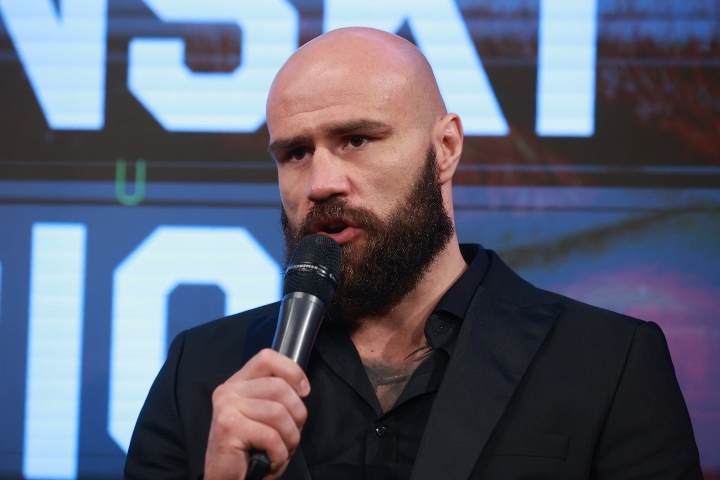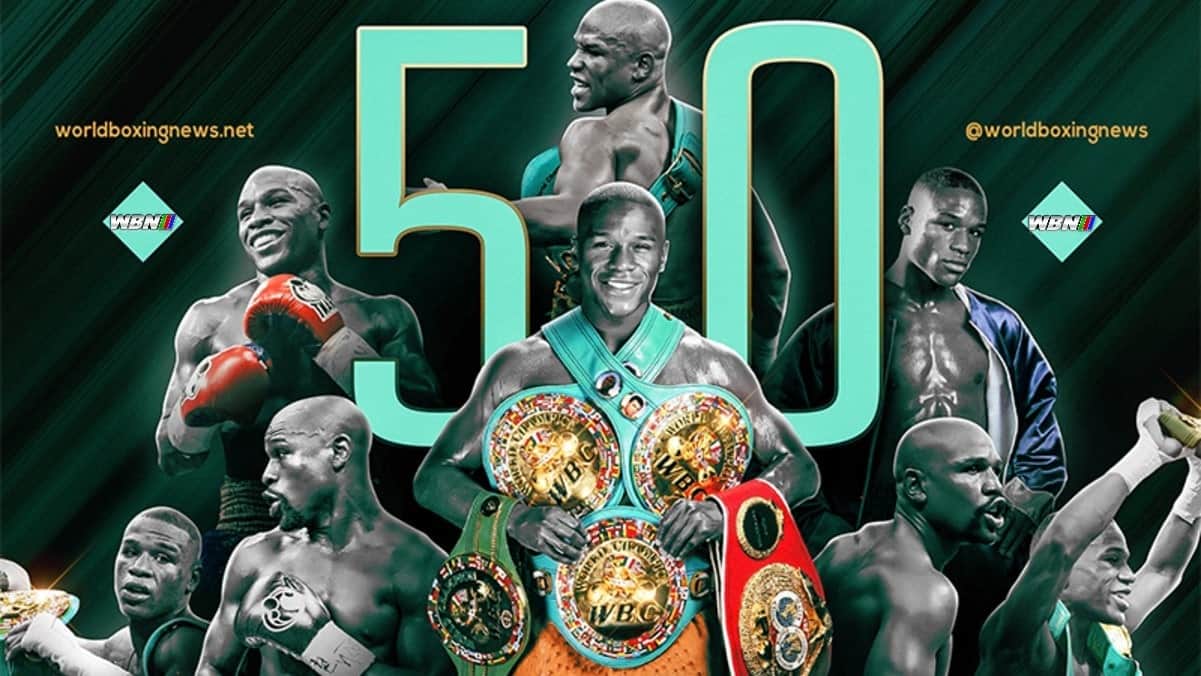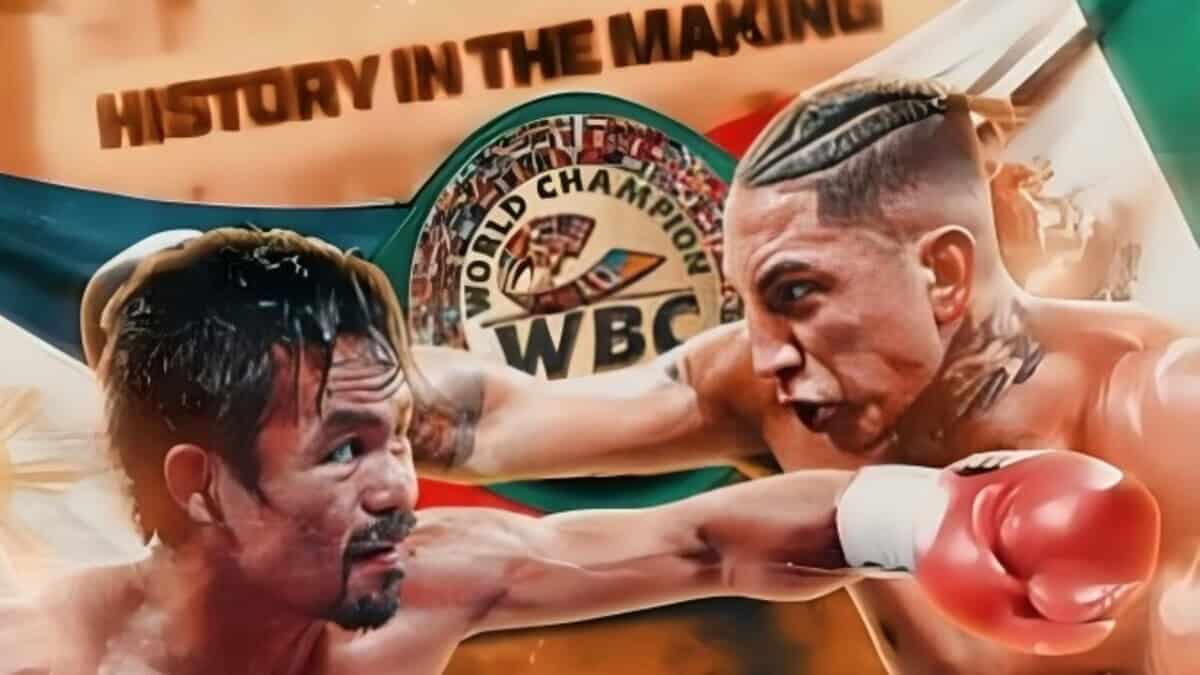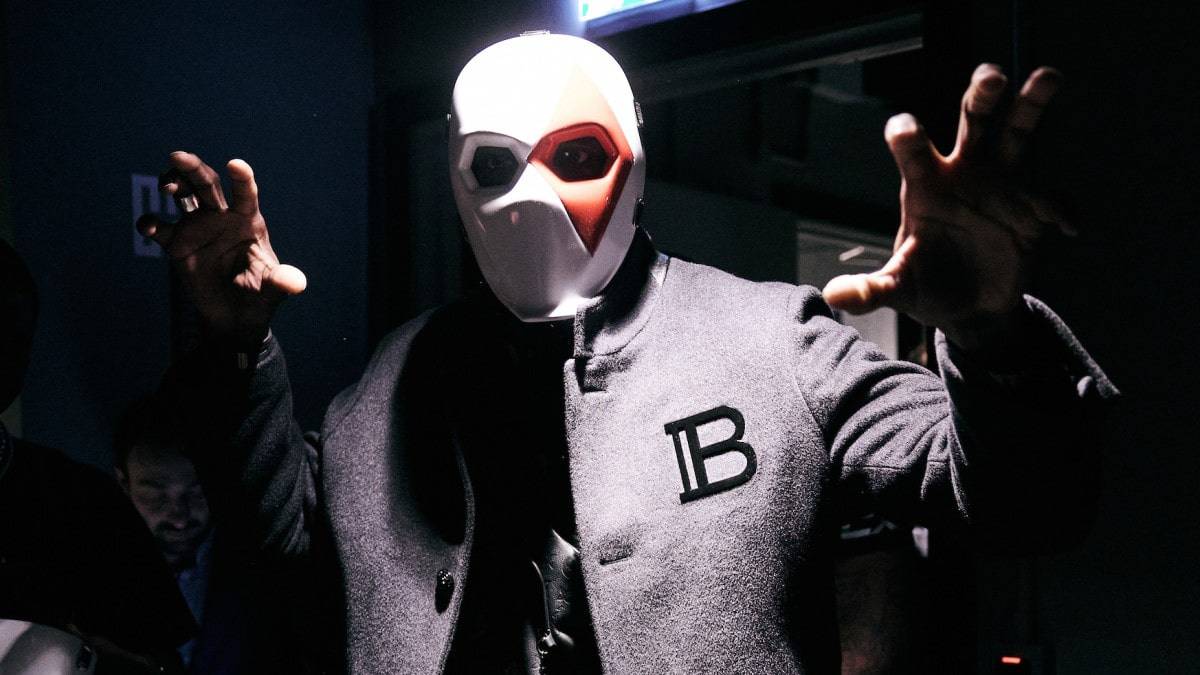Boxing
Johnny Fisher’s coach calls for Alen Babic’s ‘heat’
Published
7 months agoon
By
J. Humza
Mark Tibbs identified Alen Babic as Johnny Fisher’s next opponent after watching him spar.
The heavyweights will clash Saturday at the Copper Box Arena in London in what will be the 25-year-old Fisher’s biggest and most hard fight yet.
The Croatian Babic, like Fisher, built his reputation on participating in spectacular fights, usually organized by Matchroom, but Tibbs, Fisher’s trainer, knew about him even before his professional debut.
It was when Dillian Whyte – then working under Tibbs and in the process of putting together his best performances and recording his best wins – was preparing to fight Oscar Rivas in July 2019, that Babic was hired as a sparring partner and for the first time made an impression on the coach.
After getting a close look at Fisher and not being impressed by the list of opponents previously lined up against him on Saturday, Tibbs asked to match up his main contender with the 33-year-old Babić.
Babić was stopped in a round by Łukasz Różański in a low-profile bridge division in April 2023, but like Fisher, he remains undefeated at heavyweight and, Tibbs believes, is well-positioned to test Fisher because his alternative opponents lack ambition.
“I passed it on to Johnny,” the coach said. “I looked at the opponents they put up against me and those above him in the top ten in the UK – there are still battles going on between them.
“I was shown some Americans and I thought, ‘I don’t see any development if he gets rid of them; if he didn’t get rid of them, it wouldn’t look good.’ There were [Gerald] Washington; [Mariusz] Wah; among a few others and I just thought they wouldn’t be doing Johnny any favors.
“I just thought about that [Babic]. “I’ll give you a name. Think about it.” I left and the next thing I know, it’s over. If we execute our game plan in this fight, Johnny will be a bigger star than he already is.
“I like [Babic’s] fighting style. You don’t have to look for it. Looking at his last fights, for the fans, he would be a winner. You’re never protected when you have a guy who wants to fight; who wants to win; who came to win. But [Fisher’s] he just won the area title and he’s going to fight people who want to win; when they get punched in the face, come back. He’s a very proud man, Alen Babic. I know him very, very well.
“When he first came to the UK, Dillian hired him to spar when we fought Rivas. The day I picked him up I went to Nando’s with him. Lovely ancient chap – a real, lovely guy. A real fighter. Aged school. I didn’t want to mess with any S&C – I just wanted to fight. So I know him really well.
“This is not a walkover. We have to get the right tactics and we’re not going to underestimate him, but Johnny has what it takes to beat him.
“He just wants to go to war right away – he’s not afraid to go to war. He doesn’t care. He tore into Dillian in the first round. I said, “Hold on, hold on – we’re fighting in a few weeks.”[Dillian said] “No no. Let him go, Mark. Let him go, Mark.” That’s how it was. But he was wonderful, Alen. He was wonderful. “Serene down a little, Al – please.” He’s a wonderful character. He’s a fighter and he’s going to fight.”
Fisher was the winner of the recent Boxing Writers’ Club Newborn Fighter of the Year award. He is also a popular figure whose value lies largely in his ability to sell lots of tickets to fight nights, but he remains so unproven that the subject of his potential wrongdoing divides opinion.
“We can’t afford to make any mistakes,” Tibbs continued. “I’m for it. We’re for it. We can’t afford to make any mistakes. We don’t want to stop and we don’t want to let the British public down. They’re spending a lot of money – he’s selling a lot of tickets. We want to play the game and bring Johnny in – develop him. Develop his confidence and everything.
“[Babic is] wild swinger. A bit changeable. But I think it will be good for us.
“[Fisher’s] he has a huge heart. But it takes more than just the heart – there are levels. All we can do is polish him and make him sweet – serene him down a little, if at all. He does it. You saw him [stoppage of Dmytro Bezus in Las Vegas in February in his past] fight – excellent. A little wild in the first rounds; corrected him, and he did it immediately.
“Straighten your right arm up.” Gigantic swings. ‘What’s wrong with you?’ – Now bend it a little, but not too much. I like working with people like that – who listen and trust.
“I believe he can [reach the same level as Whyte]. He’s got the heart. The work ethic. We’ve got to keep coming back; keep fighting for that British title. If he wins that British title, the world is his oyster.”
You may like
Boxing
Floyd Mayweather’s record is not normal, it can’t happen in 70 years
Published
12 hours agoon
January 12, 2025
Floyd Mayweather’s incredible 50-0 record is not normal and cannot be repeated in sports for another seventy years.
This is the view of Saudi Arabian president Turki Alalshikh, who wants to adopt the UFC model in which fighters lose many fights during their career.
In a speech as he hosted the Ring Magazine Awards after acquiring the long-running boxing publication from Oscar De La Hoya, Alalshikh was unequivocal in his opinion.
“Now losing some fights in boxing must be normal,” he explained. “All fighters want a career similar to Floyd Mayweather – no losses. This may happen once every 50, 60 or 70 years.
“We need it [to be] like currently in the UFC model, where champions lose and win,” added the matchmaker during the Riyad season.
Mayweather rose through the sport in the tardy 1990s to become one of its youngest superstars. Mayweather’s professional success came after winning a bronze medal at the Olympics after losing to Serafim Todorov.
Winning world titles in five weight classes, Mayweather was untouchable. The Grand Rapids native only came close to defeat a few times. He dominated Manny Pacquiao and overtook Canelo Alvarez and Oscar De La Hoya after heated debates, with decisions that should have been made unanimously.
Towards the end of his career, Mayweather chose to face Andre Berto and Conor McGregor, easily winning and ending his boxing career at the age of 50 without ever going out. Calling himself “the greatest of all time,” Mayweather earned first-ballot Hall of Fame honors and is widely considered one of, if not the greatest defensive fighter of all time.
However, Alalshikh says this type of career needs to end so that fans can get the most out of boxing, as is the case with the Ultimate Fighting Championship. Boxing needs to become more attractive, and Alalshikh sees the failures of top stars as a way to keep interest at an all-time high.
In this sport, many boxers enjoy undefeated streaks, the most notable of which is Oleksandr Usyk. The Ukrainian Pound for Pound King is 23-0 and has beaten the best he has to offer in his division and cruiserweight classification.
It remains a mystery how Alalshikh plans to make Usyk suffer while he dominates everyone else. By the time his grand plan goes into action, Usyk will be long gone, and Gervonta Davis, Shakur Stevenson and Devin Haney may be more realistic targets.
Boxing
Manny Pacquiao remains the favorite to win the title against Mario Barrios
Published
7 days agoon
January 6, 2025
WBN understands that despite alternative options emerging, it is more likely that Manny Pacquiao will face Mario Barrios next.
Bob Santos, coach of WBC welterweight champion Barrios, told World Boxing News that he is currently in contact with Pacquiao’s team. Asked by WBN if he had spoken to Pacquiao or representatives of any other challenger, Santos replied: “Yes, Pacquiao’s promoter, Sean Gibbons.” Pressed on whether Barrios vs Pacquiao might happen next, he added: “It’s challenging to say. We’ll have to see how this plays out.”
WBN contacted Santos after Conor Benn emerged as a potential alternative to Barrios. The British fighter, who recently returned from a suspension following two positive drug tests, is keen to return to competition.
Benn showed favor with the World Boxing Council at the recent WBC Convention, the WBC Evaluation Committee and during an interview with the sanctioning body over the weekend. “The Destroyer” is ranked second in the rankings at 147 pounds, despite less than solid opponents during his time in exile, during which Benn competed twice in the United States while his career in the United Kingdom was in doubt.
As he battled to clear his name and with the British Anti-Doping Authority finding no evidence that Benn had intentionally taken ostarine, the 28-year-old’s career took a pointed nosedive. Despite this, he remains highly rated and at least one step away from fighting for an eliminator or one of the remaining championship titles.
However, Pacquiao remains Barrios’ favorite. Now it’s up to the boxing legend and Hall of Famer who got the first votes to secure his shot. WBN believes a July date – most likely at the MGM Grand in Las Vegas – is the most realistic date for a Nevada swan song.
Pacquiao could extend his record as the oldest welterweight champion by six years if he can secure a huge victory over the 29-year-old world champion. At 46 years antique, such a scenario remains unlikely, but he can never be compared to one of the greatest players of this generation.
Unlike heavier boxers and his training regiment, Pacquiao looks in great shape despite his advanced age. Everything is set for a massive return to the boxing capital of the world, provided Pacquiao and his team can manage his political ambitions, which are expected to run from this month until May. After that time, Pacquiao could find himself in the summer finals and become the all-time champion, regardless of the result.
Barrios is based in the city, where he trained with Santos, and would be the perfect opponent to see out the career of one of the greatest fighters in history.
Boxing
A report about Deontay Wilder retiring at the age of 39 has been confirmed as false
Published
1 week agoon
January 2, 2025
Deontay Wilder has not retired from boxing at the age of 39, and the former WBC heavyweight champion has not issued any official statement.
World Boxing News can confirm that reports circulating on social media are false and originated from a imitation account on Up-to-date Year’s Day. As of January 2, 2025, WBN has had no word from Wilder that he plans to hang up his gloves.
As usual, WBN also asked Shelly Finkel for comment. However, Finkel has repeatedly said in the past that Wilder is not retiring. This case seems to be no different.
The last time Wilder spoke publicly was while promoting a mental health app, the Brown Bomber was unveiling plans to return to the sport.
He said: “The push-up protocol has been disabled. Strengthen your body and train your mind; no paid subscription required! It’s not about money. It’s about a mission to strengthen mindsets and improve mental health for all.
To everyone: operate your services and achieve greatness.
“There will be people who tell you, ‘No, you can’t.’ [No] People trying to stop you or putting up stop signs. [No] People who want to bring you down and keep you down. But you can’t give up.
“No matter how many times you fall, no matter how many times you get knocked down, it’s a resilient mind, a confident mind, a powerful mind that gets back up and keeps moving forward to achieve your greatness.
“Apply your service. Achieve your greatness,” he added.
Deontay Wilder could announce his retirement tomorrow if he changed his mind, but at the time of the report, there was no truth to it.
When Zhilei Zhang knocked him out on June 1 in Saudi Arabia, the formidable top-flight contender needed time to assess his situation. WBN understands that Wilder has received offers, including contact from Francis Ngannou, regarding a possible boxing match with the MMA star.
The Wilder vs. Ngannou fight only makes sense for an American his age. Many voluntary positions [of which Wilder is WBC number 13] are occupied by threatening opponents who would start each clash as favorites.
Meanwhile, the Ngannou fight is winnable with less risk and more rewards, meaning Wilder can still earn a significant payday before hanging up his gloves for good.

Dan Rafael on TYSON FURY VS ANTHONY JOSHUA – ‘TYSON FURY HAS TO BE THE FAVOURITE!’

“I Think Fury and Joshua Retire This Year!” – Johnny Nelson

Callum Simpson vs. Steed Woodall
Trending
-

 MMA8 months ago
MMA8 months agoMax Holloway is on a mission at UFC 212
-

 Interviews3 months ago
Interviews3 months agoCarl Froch predicts that Artur Beterbiev vs Dmitry Bivol
-

 MMA8 months ago
MMA8 months agoCris Cyborg ready to add a UFC title to her collection
-

 MMA8 months ago
MMA8 months agoThe Irish showed up in droves at the Mayweather-McGregor weigh-in
-

 Interviews3 months ago
Interviews3 months agoArtur Beterbiev vs Dmitry Bivol
-

 Boxing6 months ago
Boxing6 months agoLucas Bahdi ready to test his skills against Ashton Sylve
-

 Interviews8 months ago
Interviews8 months agoI fell in love with boxing again
-

 Opinions & Features3 months ago
Opinions & Features3 months agoDmitry Bivol: The story so far



